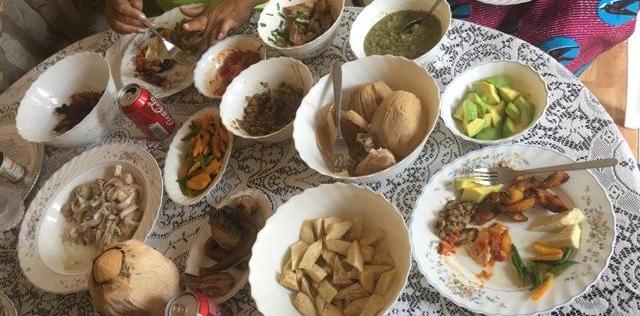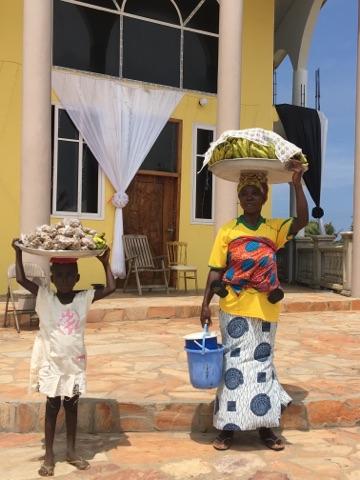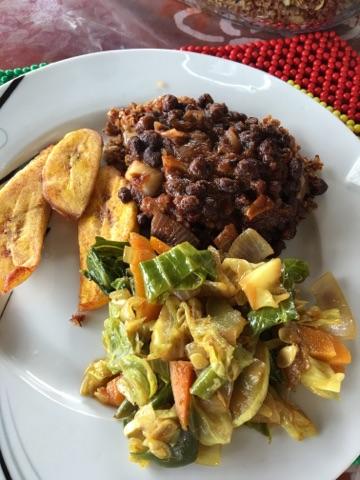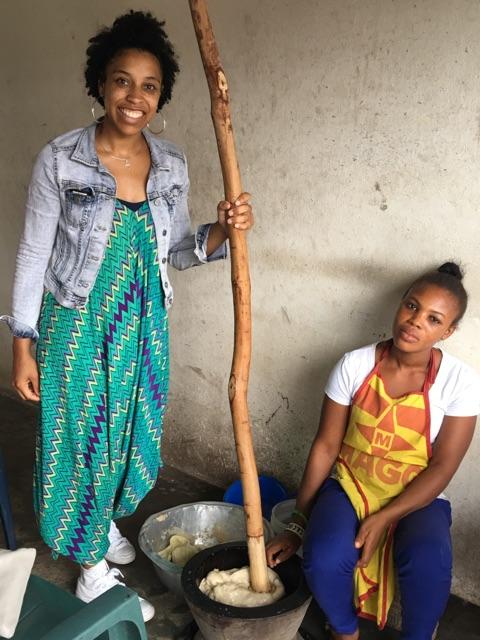I can still taste the yam, red-red, sautéed vegetables, and stewed tomato sauce that we ate almost every day in Ghana, West Africa. I can still smell the freshly fried plantains seasoned with aromatic spices nothing was overcooked, but cooked just right. The black-eyed peas were always easy to chew and well seasoned but not mushy. All vegetables were cooked in very little oil, just until tender to the bite, but left with a crunch so the nutrients were still intact. Yams were always boiled to perfection, fork-piercing soft only. Delicious! All of it!
Why Ghana
My trip to Ghana was a mother-daughter trip, which included my mother, my two older sisters, and me. For years, we had wanted to plan a family trip to Africa to pay homage to our direct ancestors, but for many reasons had never actualized that dream. Finally, last year on my moms’ 65th birthday, she declared that we would take the trip and ful fill one of our major lifelong dreams!
Rewind back to about six years ago when my great uncle passed: My family had a heritage DNA test done on his body in which we discovered that we had some Ewe and Nzema (two prominent cultural groups in Ghana) DNA in our familial bloodline on my grandmother’s father’s side. Fast-forward to my mothers birthday last year: We treated her to the African heritage DNA test for my grandmothers maternal bloodline and found out that we had heritage from Sierra Leone, Guinea Bissau, and Nigeria.
With more choices than we anticipated, we decided to go with Ghana since it is known as a good introduction destination to West Africa. Ghana is known historically as being very welcoming to descendants of the African Diaspora, as its governments have historically encouraged people of African ancestry to return to Africa to visit, buy land, and unite with Africans who remained on the continent. Famous African Americans such as Muhammad Ali and W.E.B. Dubois spent time in Ghana.
In addition, English is the national language there, although if you don’t have a good ear you may not think so because it is spoken with an accent and mixed with local languages such as Twi, especially in major cities. Ghana has also generally been a peaceful country without modern wars, economic issues, or major distress. Thus, we agreed to go to Ghana for our first trip to Africa, and it was a good choice.
The Food Experience
During the two-week stay, we ate almost every day, every meal, as a family. It was beautiful to share communal meals while we laughed and talked about our day ahead or our day coming to a close. We were blessed to stay with family friends in Accra, the capital, and have Monica, their sweet and kind live-in chef and surrogate daughter, cook for us each day.
Monica has been a house helper for the family for over 10 years, and they helped put her through college for hotel hospitality and where she trained as a chef. Her cooking is flavorful and delicious! It was truly a treat, and we felt like royalty to have all of our meals prepared fresh daily.
Based on my own academic research and experience working for Oldways, I was prepared to have many foods I recognized and was excited to taste them! We ate many things most people of African descent from all over the Diaspora are familiar with: chicken, fish, black-eyed peas, kelewele (plantains cubed and cooked in fragrant spices), okra, string beans, carrots, beets, avocado (called pear), yam (white starch, not candied), rice, millet, oatmeal, waakye (black-eyed peas and rice mixed), palava sauce (melon seed stew with coco yam leaves), cabbage, stewed red beans, curried vegetables, and more.
Ghanaian food, like all African cooking, is made with depths of flavors. The meals we enjoyed were made with seasonings and spices such as anise, thyme, clove, turmeric, bay leaves, cumin, and calabash nutmeg. We also had delicious local and seasonal fruit, such as baby bananas, papaya, mango, and infamous Ghanaian white pineapple that was out-of-this-world good!
We did not get to experience much street food since our family friends did not think it was safe for us to eat. At all of hours of the day and night you can and stands, markets, and individuals selling all types of snacks and meals like plantain chips (we did eat these, and they were delicious and fresh unlike the packaged kind sold in the U.S.), popcorn, roasted or boiled groundnuts, roasted corn on the cob, fermented maize, whole roasted bush meat, leafy greens in bundles, grilled meat kabobs, yam fries, fresh fruit, candy, and more.
I had no problem being vegan while I was there because all vegetables were prepared without any meat, meat broth, or meat seasonings per my request, and Monica had no problem adjusting. In fact, our Ghanaian family friends told me that traditionally, vegetables are not prepared with meat, but rather meats and vegetables are easily cooked separately.
When we traveled away from our home base, the dificulty of eating vegan varied. Some places had fewer options than others, but most restaurants accommodated me with no problem. My favorite dishes were black-eyed peas, kelewele, and yams with stewed tomato sauce, and waakye, and palava sauce.
I highly encourage everyone to experience Ghanaian food, even if at first it is just at a restaurant near you! Experience the smells, the taste, the spice, and the sharing. If you are of African descent and worried about traveling to Ghana because you think it will be too much of a foreign experience, you may be pleasantly surprised at how familiar it really is!
Medase (thank you) Ghana for everything, until real soon!
Sade Anderson, Program Manager/African Diaspora Specialist, African Heritage & Health
All photos courtesy of Sade Anderson









